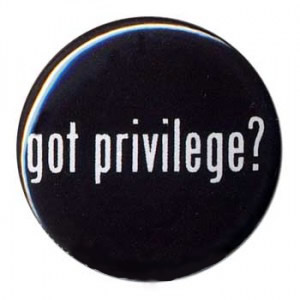Quotes from Peggy McIntosh (Quote Post)
Reading Peggy McIntosh’s article, White Privilege: Unpacking the Invisible Knapsack truly opened my
eyes to the undeserved privilege that white Americans are treated with on a
daily basis. Being white myself, I had never thought about what it meant to be “privileged”
because of the color of my complexion, and have taken this freedom for granted
in my own life, not realizing the extent of my own unearned privileges. While
reading, I came across a few passages in particular that struck me as important
because even though they are simple and present in our everyday lives, they carry
so much importance in the issue of racism in our society.
“Many, perhaps most,
of our white students in the United States think that racism doesn’t affect
them because they are not people of color; they do not see “whiteness” as a
racial identity.”(5)
Growing up in a mostly white community, I grew up with the
perspective that being white was considered “normal,” and any other color of skin
immediately stood out as different. When
we talked about race in school, we only learned the terms “Black,” or “African
American”; “Indian” or “Native American”; “Asian,” etc…But never “white.” To us students, we didn’t identify
as really having a race. As McIntosh explains, this becomes problematic because
white people begin to set themselves higher up on the social ladder, causing
whites people in America to think that the term “racism” cannot apply to them
because they do not identify as having a race. This false sense of invincibility
leads to white dominance.
“When I am told about
how our national heritage or about “civilization,” I am shown that people of my
color made it was it is.” (2)
McIntosh includes this statement in a list of unearned advantages
given to the white American population. One of the reasons that whiteness is valued in
our dominant ideology is because the founding fathers of our nation were all
white. While all Americans can recognize this, what we fail to realize is the
lack of representation of successes of other races leads to the assumption that
whites are the most powerful and most capable of leading, and therefore, “better.”
We actually learn that whites are
more important in schools.
I found an interesting article about teaching racism indirectly
here: http://www.huffingtonpost.com/nicholas-ferroni/teaching-education-discrimination_b_1826113.html
“Most talk by whites
about equal opportunity seems to me now to be about equal opportunity to try to
get into a position of dominance while denying that systems of dominance exist.”
(6)
I had to reread this statement a few times before I
understood what McIntosh meant by this.
How I interpreted her view her here is that while white people are
attempting to recognize the problems with racial inequality, they try to get
rid of the problem using logic that is actually a hypocritical paradox – they
talk about “equal opportunity” for people of all colors, trying to reject or play
down the power of white privilege by elevating the status of all other races.
But, they use this strategy to protect their privileges while making them seem like less
of an oppressor to society. If this is the case, it’s not actually getting rid
of the problem, is it?
I hope we can discuss this last quote in class in more
detail – I’m interested in learning what you think about it. How white people
can handle their privileges in a democratic way and strive towards finding
equality between races?

Hi Julie! I really liked your post and how you included all of the quotes. All of the quotes you chose really stood out to me too, especially the last one. I had to reread it a couple of times too, it was kind of confusing to me, but i agree with how you interpreted it. It's not getting rid of the big problem. I like how you connect the second quote on the article about teaching racism too. Nice post!
ReplyDelete